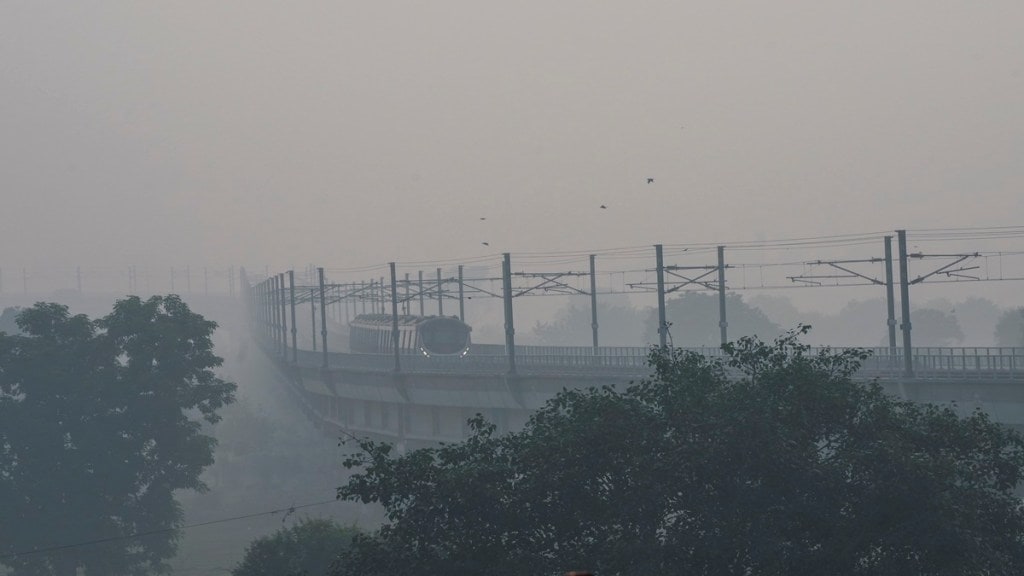Delhi Air Pollution: In the past few days, the air quality of the National Capital has become extremely poor. On Tuesday, the air quality dropped to the ‘very poor’ category as Air Quality Index (AQI) of 385 recorded at around 8 am, according to the Central Pollution Control Board (CPCB).
Meanwhile, areas like Anand Vihar, Kalkaji, Nehru Place, and Akshardham Temple were wrapped in a thick layer of smog early in the morning today worsening visibility. As the air quality continues to worsen, the Commission for Air Quality Management (CAQM) has invoked stage two of the anti-pollution plan GRAP this morning.
An AQI between 0 and 50 is considered good, 51 and 100 satisfactory, 101 and 200 moderate, 201 and 300 poor, 301 and 400 very poor, 401 and 450 severe, and above 450 severe-plus.
A forecast by the India Meteorological Department (IMD) maintains that the daily average AQI of Delhi is expected to stay in the ‘very poor’ category in the coming days owing to unfavourable meteorological and climatic conditions. Stubble burning in neighbouring Haryana and Punjab is also often blamed for the rise in pollution levels in Delhi, especially during the post-harvest season of October and November.
Meanwhile, doctors and health experts maintain that poor air quality pose as a serious health risk.
“As a pulmonologist, I can say that the worsening air quality in Delhi is a serious concern for human health. Poor air quality, especially the increase in particulate matter (PM2.5 and PM10), can have both immediate and long-term effects on the lungs and overall respiratory system. Persistence of dust particles in air too affects lungs negatively and contributes to air pollution,” Dr. Vikas Maurya, Senior Director and HOD Pulmonology, Fortis Shalimar Bagh told Financial Express.com.
How poor air quality affects you?
In the short term, people may experience symptoms like coughing, wheezing, shortness of breath, sudden decrease in lung function, and irritation of the eyes, nose, and throat.
“For those with pre-existing respiratory conditions like asthma or chronic obstructive pulmonary disease (COPD), poor air quality can lead to exacerbations, making it harder to breathe and increasing the need for medical interventions. It can also cause respiratory infections like upper respiratory tract, lower respiratory tract and pneumonia, increase OPDs, hospitalisations and ICU admissions,” Dr. Maurya told Financial Express.com.
Long-term exposure to polluted air increases the risk of developing chronic respiratory diseases, asthma, COPD including lung cancer. It can also affect the cardiovascular system, leading to an increased risk of heart attacks and strokes, neurological disorders, developmental disorders. Children, the elderly, and those with weakened immune systems are particularly vulnerable.
“It’s crucial for people to take precautions, such as wearing masks, using air purifiers indoors if are immobile on bed and are of high risk category and avoiding outdoor activities when air quality is poor. On a larger scale, improving air quality requires collective efforts to reduce emissions from vehicles, industries, and other pollutants,” he said.
Moreover, Dr Kuldeep Kumar Grover, Head of Critical Care and Pulmonology – CK Birla Hospital, Gurugram told Financial Express.com that he has seen an impressive increase in patients suffering from both acute and chronic diseases related to the lung, the most vulnerable patients include children, the elderly, and those with pre-existing lung diseases.
What are immediate health impact of poor air quality?
Exposure to a high level of air pollution—primarily particulate matter (PM2.5 and PM10), nitrogen dioxide (NO2), and sulfur dioxide (SO2)—causes respiratory problems, from asthma attacks, bronchitis, to worsening of COPD, Dr. Grover said.
“Children have experienced growing cases of asthma, and respiratory infections that keep them hospitalized due to exacerbations. Patients with pre-existing conditions also feel that they tend to experience a stronger negative effect on handling symptoms, either requiring more medicines such as inhalers and steroids,” he said.
What are the long-term health effects of poor air quality?
Long-term exposure to polluted air can lead to chronic respiratory diseases, such as permanent damage to the lung and a decrease in lung function, Dr. Grover revealed.
“Also, evidence is mounting that long exposure to pollutants will contribute to lung cancer even in non-smokers. Extrapolating beyond the respiratory system, the pollutants also contribute to cardiovascular diseases, including heart attacks and strokes,” he told Financial Express.com.
Other emerging studies highlight some research association of air pollution with mental health disorders and cognitive decline, especially in the elderly, he said.
Who are at risk?
Elderly with developing lungs are at a high risk for permanent damage. According to Dr. Grover, older adults and immunocompromised are at higher risk for severe respiratory infection.
“Exposed pregnant women are at risk since exposure to such air pollution has been associated with increased rates of low-weight births and preterm deliveries,” he told Financial Express.com.
Preventive measures one can take include staying indoors when pollution levels are high, using air purifiers in the home, and carrying N95 masks outside, Dr. Grover emphasised.
However, importantly what is needed here is comprehensive public health policies to reduce vehicular emissions and industrial pollution to curb this crisis, he said.

